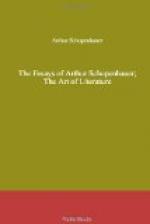Authors of the second class, who put off their thinking until they come to write, are like a sportsman who goes forth at random and is not likely to bring very much home. On the other hand, when an author of the third or rare class writes, it is like a battue. Here the game has been previously captured and shut up within a very small space; from which it is afterwards let out, so many at a time, into another space, also confined. The game cannot possibly escape the sportsman; he has nothing to do but aim and fire—in other words, write down his thoughts. This is a kind of sport from which a man has something to show.
But even though the number of those who really think seriously before they begin to write is small, extremely few of them think about the subject itself: the remainder think only about the books that have been written on the subject, and what has been said by others. In order to think at all, such writers need the more direct and powerful stimulus of having other people’s thoughts before them. These become their immediate theme; and the result is that they are always under their influence, and so never, in any real sense of the word, are original. But the former are roused to thought by the subject itself, to which their thinking is thus immediately directed. This is the only class that produces writers of abiding fame.
It must, of course, be understood that I am speaking here of writers who treat of great subjects; not of writers on the art of making brandy.
Unless an author takes the material on which he writes out of his own head, that is to say, from his own observation, he is not worth reading. Book-manufacturers, compilers, the common run of history-writers, and many others of the same class, take their material immediately out of books; and the material goes straight to their finger-tips without even paying freight or undergoing examination as it passes through their heads, to say nothing of elaboration or revision. How very learned many a man would be if he knew everything that was in his own books! The consequence of this is that these writers talk in such a loose and vague manner, that the reader puzzles his brain in vain to understand what it is of which they are really thinking. They are thinking of nothing. It may now and then be the case that the book from which they copy has been composed exactly in the same way: so that writing of this sort is like a plaster cast of a cast; and in the end, the bare outline of the face, and that, too, hardly recognizable, is all that is left to your Antinous. Let compilations be read as seldom as possible. It is difficult to avoid them altogether; since compilations also include those text-books which contain in a small space the accumulated knowledge of centuries.
There is no greater mistake than to suppose that the last work is always the more correct; that what is written later on is in every case an improvement on what was written before; and that change always means progress. Real thinkers, men of right judgment, people who are in earnest with their subject,—these are all exceptions only. Vermin is the rule everywhere in the world: it is always on the alert, taking the mature opinions of the thinkers, and industriously seeking to improve upon them (save the mark!) in its own peculiar way.




